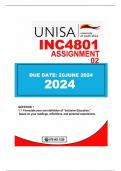,INC4801
ASSIGNMENT 02 - DUE 20 JUNE 2024
1.1Formulate your own definition of “Inclusive Education,” based on your
readings, reflections, and personal experiences.
Based on my readings, reflections, and personal experiences, I define "Inclusive
Education" as: "A student-centered approach to education that values diversity,
promotes equity, and supports the academic, social, and emotional development
of all learners, regardless of their background, culture, language, ability, or
disability. Inclusive education fosters a sense of belonging, encourages
participation, and provides opportunities for learners to reach their full potential
in a safe, supportive, and stimulating learning environment."
It involves creating a supportive and accepting environment that accommodates
the diverse needs of all learners, including those with autism spectrum disorder.
Inclusive Education promotes the full integration of students with disabilities into
mainstream classrooms, with the necessary support and accommodations to
ensure their success. This approach also emphasizes the involvement of parents,
teachers, and the broader community in supporting and advocating for the needs
of all learners.
This definition is informed by the following principles and references:
1. Valuing diversity: Inclusive education recognizes and appreciates the diversity
of learners' experiences, cultures, and backgrounds (Gay, 2000).
2. Promoting equity: Inclusive education aims to address the systemic barriers
and biases that prevent marginalized groups from accessing quality education
(Ladson-Billings, 1995).
, 3. Supporting all learners: Inclusive education provides opportunities for learners
with disabilities, language barriers, or other challenges to participate fully in the
learning process (UNESCO, 2009).
4. Fostering a sense of belonging: Inclusive education creates a welcoming and
inclusive learning environment that promotes social cohesion and a sense of
community (Hattie & Timperley, 2007).
5. Encouraging participation: Inclusive education encourages learners to take an
active role in their learning and provides opportunities for them to engage with
the curriculum in meaningful ways (Black-Hawkins, 2016).
References:
Black-Hawkins, K. (2016). Teacher education and the development of inclusive
pedagogy. Teaching and Teacher Education, 55, 277-286.
Gay, G. (2000). Culturally responsive teaching: Theory, research, and practice.
Teachers College Press.
Hattie, J., & Timperley, H. (2007). The power of feedback. Review of Educational
Research, 77(1), 81-112.
Ladson-Billings, G. (1995). But that's just good teaching! The case for culturally
relevant pedagogy. Theory into Practice, 34(3), 159-165.
UNESCO (2009). Policy guidelines on inclusion in education. UNESCO.
1.2
1.2.1 Use the critical theory lens to evaluate the implementation of Inclusive
Education for learners on the autism spectrum in Gauteng, South Africa. You may
provide examples from the extract and other current examples to substantiate
your answer.




